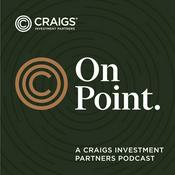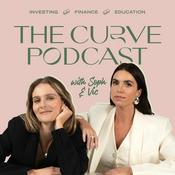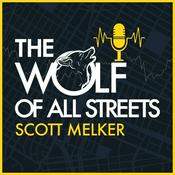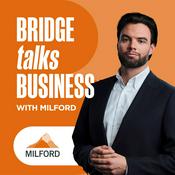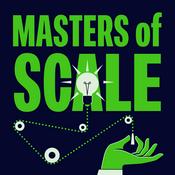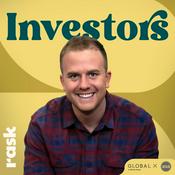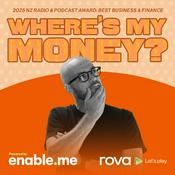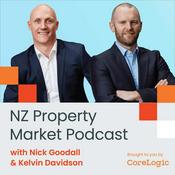204 episodes
Philip Johnston TED Talk: StarCloud's Plan to Move Data Centers to Space - Reaction Video
18/2/2026 | 24 mins.Philip Johnston is the CEO of Starcloud. He put an Nvidia H100 chip in space and gave a TED talk about it. As you do if you're responsible for building the infrastructure for space-based data centers.
Elon Musk was not the first. He follows in the footsteps of Mr Johnston. And so, rather than Mr SpaceX, our first technology reaction video is this TED talk from San Francisco.
We watched it for the first time. Live. On TV.
This is not theoretical. It's also not up to date. Philip filmed this in October 2025. Starcloud have already launched the Nvidia H100 on a Falcon 9 up into space.
It's happening disruptors and curious minds. It's happening.
Philip predicts most data centers will be in space within 10 years.
We agree.
Please enjoy the show.
Cheers,
Mark & Jeremy.
--
Other ways to connect with us:
Listen to every podcast
Follow us on Instagram
Follow us on X
Follow Mark on LinkedIn
Follow Jeremy on LinkedIn
Read our Substack
Email: [email protected]- Dr. Philip Metzger spent nearly 30 years at NASA before joining the University of Florida to research what happens when rockets land on the moon.
Rocket exhaust blows lunar dust at three kilometers per second. Without an atmosphere to contain the blast, every launch becomes a global event. A 40-ton lander one kilometer from an antenna will jam it after ten launches. NASA's Artemis program wants a sustained lunar presence. China aims for 2029. Multiple nations and private companies are racing to the moon.
But no one has agreed on how much damage is acceptable or who decides.Elon Musk concluded we cannot build enough AI on Earth without environmental catastrophe and said factories must be built on the moon. When AI production moves to space, Metzger's research shows it will drag the entire space economy upward to values billions of times Earth's current output.
If a few people control an industry that produces a billion times Earth's economic value, democracy cannot survive. They will buy politicians and control militaries. The stakes couldn't be higher. Metzger now directs the Stephen Hawking Center for Microgravity Research and Education, creating programs for students worldwide to develop space technology, own intellectual property, and start companies. Questions answered:- After Artemis, will NASA still have a role to play?- What makes Starship critical for lunar operations?- When will data centers in space be cheaper than on Earth?- Are hotels on the moon actually viable?- Why mine the moon for Helium-3?- When will asteroid mining become profitable?- Why does lunar rocket dust create international conflict?- What is "fully autonomous luxury communism"?- How can students globally participate in space and own IP?- What can past economic revolutions teach us about space?- What products make economic sense to manufacture in space?- What are the environmental limits of launch rates?- How does space ownership affect democracy's survival?Metzger led NASA's research on rocket blast effects for lunar missions - studying how rocket exhaust affects the airless moon and the infrastructure that will be built on the surface. He now directs the Stephen Hawking Center for Microgravity Research and Education, working on how to democratize space ownership globally.Please enjoy the show.Cheers, Mark & Jeremy.
Please enjoy the show.
Cheers,
Mark & Jeremy.
--
Take your Thinking Further.
Stephen Hawking Center: https://sciences.ucf.edu/physics/microgravity/lab/
Philip X: https://x.com/drphiltill
-
Other ways to connect with us:
Listen to every podcast
Follow us on Instagram
Follow us on X
Follow Mark on LinkedIn
Follow Jeremy on LinkedIn
Read our Substack
Email: [email protected]
--
TIMESTAMPS
(00:00) Introduction to Space Exploration and Economics
(01:26) NASA's Role in Future Space Exploration
(06:45) Impact of Rocket Exhaust on Lunar Soil
(14:39) Geopolitical Challenges in Space
(23:39) Democratizing Space for Future Generations
(33:45) Emergent Forces vs. Hierarchical Forces
(34:08) Exploring Microgravity Applications
(38:39) Rapid Fire Space Technology Opinions
(44:02) The Future of Humans and Technology - Iona delivery drones are not your typical multi-propeller drone. They're small planes with a bathtub-sized cargo bay, but take off vertically, then the propellers tilt and it flies like an actual aircraft.
Listen up disruptors and curious minds! Today we're Thinking On Paper with CEO and founder Etienne Louvet.
On the agenda?
A new logistics vertical in the sky
Why British weather is the perfect training ground for delivery drones
What BVLOS actually means
Why "beyond visual line of sight" is critical
Why Iona are deliberately working under the strictest aviation regulators instead of going somewhere easy.
Please enjoy the show.
Cheers,
Mark & Jeremy.
PS: Subscribe so other curious minds like you can find our channel.
--
Other ways to connect with us:
Listen to every podcast
Follow us on Instagram
Follow us on X
Follow Mark on LinkedIn
Follow Jeremy on LinkedIn
Read our Substack
Email: [email protected]
--
TIMESTAMPS
(00:00) Intro
(01:50) How much weight can drones carry
(02:29) What counts as light cargo
(06:51) How drone regulations actually work
(13:04) Self-assessment and risk management
(14:12) Getting municipalities to say yes
(16:38) Weather problems
(19:48) Where Iona Drones is now
(20:58) Maximizing payload capacity
(21:58) Drone design choices
(23:27) BVLOS explained
(26:08) Drones and privacy concerns
(30:45) Implementing drones in existing logistics
(35:02) Where autonomous delivery is headed
(39:30) Technology and human progress - Can you use AI to think better or think more critically? Philosopher Pia Lauritzen says no. The second we give up to the shortcut use AI, we are letting go of the very basic condition that forces us to think.
When we ask if machines can think, the first question should be: why do humans think? Why do we think?
For Pia, it is fairly simple. We think because we know there is something we do not know. We have a problem. There is a gap. A gap between what I know and what I want to know.
So I have to start thinking. That is why I ask these questions and that is why I put up with this pain in my head of trying to figure something out that I do not know.
The machine does not have that problem. It does not know that it does not know.
It is like an animal.
It does not know that it does not know.
Of course it is a matter of how you understand thinking. But if you consult the old thinkers and not just the engineers and technologists, then you will have a really hard time finding anyone who would say that a machine could ever think.
And if it cannot think itself, why should it be able to help us think? We are the only ones who know how to do that.
This is the core problem. AI feels helpful. It removes the discomfort of not knowing where to start. It fills the blank sheet. But that discomfort is not a bug.
That discomfort is the feature. That discomfort is what thinking is.
And it is at this point that I am reminded of the scene in Con Air. Define irony.
Please enjoy the show.
Cheers,
Mark & Jeremy.
PS: Subscribe so other curious minds like you can find our channel.
--
Other ways to connect with us:
Listen to every podcast
Follow us on Instagram
Follow us on X
Follow Mark on LinkedIn
Follow Jeremy on LinkedIn
Read our Substack
Email: [email protected] - We taught technology to generate music before we taught it how to assign fair credit to musicians. Nicholas Ponari explains why Overtune rejects one-prompt AI music generation in favor of human-in-the-loop creation.
Unlike platforms trained on scraped catalogs, Overtune’s AI is built on licensed music, starting with ~20,000 loops produced in-house. Producers can submit stems voluntarily, creating a clean foundation for ethical training and attribution.
The platform uses vector-based audio embeddings to measure how much each stem contributes to a generated track. This enables automated attribution and proportional royalty distribution when songs are commercialized.
Contributions are weighted mathematically, with clear thresholds to credit primary and secondary influences while avoiding excessive fragmentation
Please enjoy the show.
Cheers,
Mark and Jeremy
PS: Subscribe so other curious minds like you can find our channel.
Other ways to connect with us:
Listen to every podcast
Follow us on Instagram
Follow us on X
Follow Mark on LinkedIn
Follow Jeremy on LinkedIn
Read our Substack
Email: [email protected]
More Business podcasts
Trending Business podcasts
About TOP Tech
Thinking On Paper is a technology show hosted by Mark Fielding and Jeremy Gilbertson. Described by The new Tech media as "a refreshing antidote to the stream of clone Silicon Valley tech shows", the CEOS, founders and outliers of space, AI and quantum Think On Paper about the human impact of progression at all costs.
Kevin Kelly, IBM, Don Norman, Carissa Veliz, Phillip Metzger, Microsoft, D-Wave all Think On Paper.
This isn't about seed rounds and investments, it's about connecting the dots of all technologies and working out why it matters to the regular people out there.
Podcast websiteListen to TOP Tech, The Happy Saver Podcast - Personal Finance in New Zealand and many other podcasts from around the world with the radio.net app
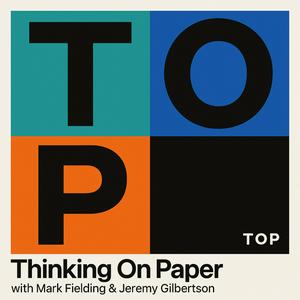
Get the free radio.net app
- Stations and podcasts to bookmark
- Stream via Wi-Fi or Bluetooth
- Supports Carplay & Android Auto
- Many other app features
Get the free radio.net app
- Stations and podcasts to bookmark
- Stream via Wi-Fi or Bluetooth
- Supports Carplay & Android Auto
- Many other app features


TOP Tech
Scan code,
download the app,
start listening.
download the app,
start listening.






